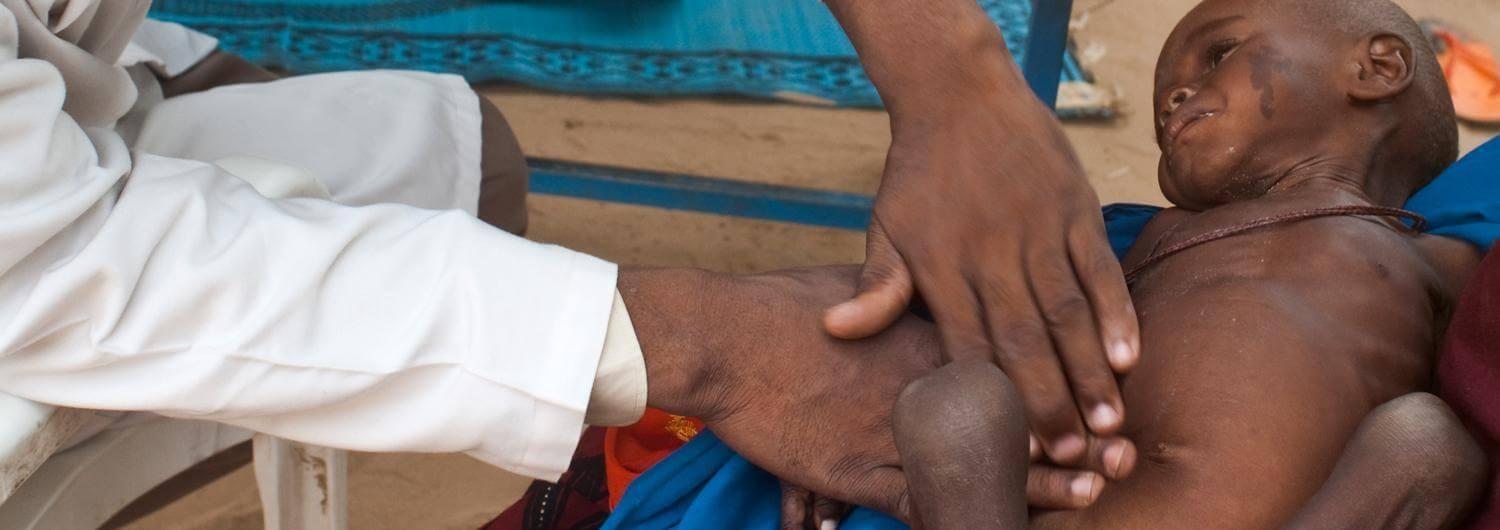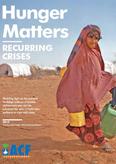
Humanitarian context
The population in Niger is experiencing its worst crisis in the last decade, with 4.3 million people in need of humanitarian support, mostly women and children. In addition to the long periods of drought and floods, is the coup d'état of July 2023. Despite the challenges, Action Against Hunger keeps its activities active in a country that faces frequent power outages, lack of fuel, price inflation and lack of cash in the banking system, as well as increasing difficulties with telephone connections, which only increases the sense of insecurity among the population.
Before this last development in the country's political panorama, over 450,000 children under five years of age were already suffering from acute undernutrition and only 56% of the population had access to safe drinking water, while only 13% had access to basic sanitation.
BENEFICIARIES
workers
NUTRITION AND HEALTH
WATER, SANITATION AND HYGIENE
EXPATRIATES
NATIONAL
Our activity
Niger continues to suffer an acute and complex humanitarian crisis, compounded by a series of interconnected crises. Persistent insecurity and its consequences, food insecurity, epidemics and floods continue to afflict the population.
The assessment of the vulnerability of the population to food, nutrition and grazing insecurity shows that almost 2.3 million people are in need of immediate assistance, while more than 3.2 million people will be vulnerable during the lean season expected in June, July and August. This situation highlights the magnitude and complexity of the crisis in the country, which requires an urgent and coordinated response by humanitarian actors and national and international authorities.
The results of the nutritional survey conducted using SMART methodology in 2022 reveal a prevalence of global acute malnutrition (GAM) of 12.2%, with 2.4% of children suffering from severe acute malnutrition (SAM). These figures place the country in a worrying position according to the WHO classification. Although the WHO alert threshold for the prevalence of global acute malnutrition is 10%, the national rate remains higher. Only Niamey is lower, at 7.8%. The same survey shows that the prevalence of chronic malnutrition (stunting) is 47% nationally (WHO threshold: 30%). Only 68.1% of newborns are breastfed during their first hour of life, and 36.2% are exclusively breastfed until 5 months of age. Acute and chronic malnutrition, which each influence one another, as well as infant mortality, represent a permanent risk to children's survival, as well as to their physical and cognitive development, which in the long term poses a risk to human capital and to the country's economic and social development.
In 2023, Action Against Hunger provided food assistance to 41,391 people in 5,913 households, or about 7 people per household. Some 55,790 children under 5 received nutritional supplements in the form of fortified flour; 23,975 disaster victims received assistance through food kits (rice, oil), and 133,116 received hygiene kits.
In Niger, efforts are concentrated in four specific areas of need identified for humanitarian assistance: Maradi, Diffa, Tahoua and Tillabery. The aim is to ensure that assistance reaches the most disadvantaged and vulnerable people, due to their geographical location and other specific challenges, such as conflicts or environmental problems. An approach that optimises the use of resources and responds to the needs of the most excluded communities.
The projects implemented in 2023 reached 254,272 people. In addition, we developed a 6-month digital campaign for nutrition; produced advocacy notes to raise awareness of reduced humanitarian access; organised a press conference on the hunger gap; conducted a study into people's access to basic social services; produced three newsletters about our interventions, three press articles published by our partners and a dozen videos documenting the situation.
WHERE WE HELP
We help 24.5 million people each year. We work in 55 countries in Africa, Asia, Latin America and Europe, those most threatened by hunger.
EYEWITNESSES
AISHA: "I WAS TOLD THAT MY SON WOULD IMPROVE. NOW HE’S GETTING BETTER AND BETTER AND I'M VERY HAPPY I CAME"
At nine months, Awalou Mourtala weighed just 4 kilos and was 62 centimetres tall, just a few grammes heavier than a newborn baby and only 10 centimetres taller. That is the state Awalou was in when he arrived at the Centre for Intensive Nutritional Rehabilitation (CRENI) in Mayahi, southern Niger. He was suffering from severe acute malnutrition.
Just eight days after his arrival, Awalou was doing much better, his head resting on the chest of his 20-year-old mother, Aisha, who knows all too well what misery is. "My baby was born healthy," says Aisha. "I gave him breast milk from birth and also gave him millet and water. Suddenly he fell ill, started having diarrhoea and vomiting, stopped eating and refused breast milk. I went to the clinic and the nurse sent me to CRENI.
CRENI in Mayahi is one of 15 outpatient centres for the treatment of malnutrition that we support, funded by the UK Department for International Development.
The rate of severe acute malnutrition in Mayahi is very high, at around 13%. In 2010, one in five people suffered severe food insecurity as a result of the disastrous agro-pastoral conditions in 2009. Deprived of access to sufficient food, thousands of families had to rely on aid from abroad for several months. These conditions increase children's risk of malnutrition. Even "normal" rates in the region were already high. To prepare for the increase in admissions to the nutrition centres, ACF organised institutional support through additional human resources, additional supplies of drugs and therapeutic foods, and training for staff in care and the use of tools and equipment.
At CRENI in Mayahi, Awalou was treated with antibiotics, anti-malarial drugs, therapeutic milk and vitamins. Gradually he began to eat, taking milk through a tube, and finally accepted to be breastfed by his mother. Aisha calmed down: "I put so much hope in getting here because we have suffered so much, and I was told that my son would improve. Now he's getting better and better and I'm very happy I came."
Hadiza Chaibou, a nurse at the centre, says Awalou stayed four days in intensive care, where his health was monitored and his symptoms disappeared. Once stabilised, he will be discharged from the centre and recommended for outpatient treatment.
In a society where women are essential to the functioning of the household and often responsible for many children, spending so much time in a medical facility can be an additional hardship. The next step will therefore be to have therapeutic foods ready to be provided to outpatients. For mothers, this is a real revolution. Each week they receive the required rations of nutritious peanut paste-based food until their children recover.
Aisha says she needs to return to her village as soon as possible. "Luckily my sister Ouma is there with me, she is a great help. She plays with Awalou while I do things like washing... she's good company."
At CRENI in Mayahi, Aisha received valuable advice on infant feeding for the future, including the importance of exclusive breastfeeding up to six months. "I now know not to give water to babies from birth, as it can cause diarrhoea. I want my children to grow up healthy."

